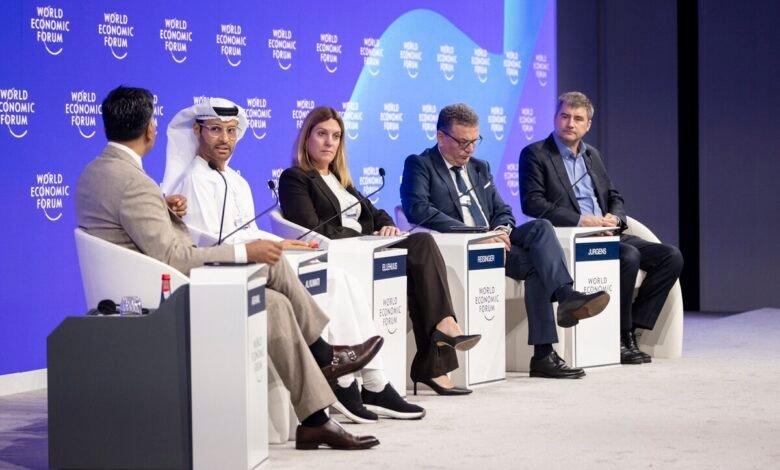Unite to Conquer Cybersecurity Threats: Key Partnerships

▼ Summary
– Cyberattacks have tripled compared to 2023, and accurate, timely data is essential to understand and mitigate AI-driven threats.
– Nations including Ukraine, Russia, India, Pakistan, Iran, Israel, and the UAE have faced escalating digital conflicts targeting critical infrastructure.
– The UAE’s cybersecurity strategy focuses on partnership, innovation, protection, governance, and legal frameworks, with initiatives like Cyber Pulse to educate citizens.
– Regional cooperation and interdisciplinary approaches are emphasized as key to achieving collective digital security and navigating AI advancements.
– Legal and governing frameworks are needed to tackle cyber threats, as discussed in sessions covering technology, economy, society, environment, governance, and health.
The global landscape of digital conflict is undergoing a dramatic and dangerous transformation, with cyberattacks surging to three times the levels seen in 2023. This alarming escalation underscores a critical reality: in an age increasingly defined by artificial intelligence, possessing precise and timely data has become non-negotiable for comprehending and countering these evolving dangers. Nations across the globe, from Ukraine and Russia to India, Pakistan, Iran, Israel, and the United Arab Emirates, are confronting a wave of digital assaults aimed squarely at their essential infrastructure.
His Excellency Mohamed Al Kuwaiti, the Head of Cybersecurity for the UAE Government, recently characterized this period as an “age of cyber wars.” He made these remarks during the Annual Meetings of the Global Future Councils and Cybersecurity 2025, an event organized by the UAE Government in collaboration with the World Economic Forum. The meetings commenced with a panel discussion, moderated by Ravi Agarwal of Foreign Policy Magazine, that explored the complex challenges arising from the fusion of generative AI and cybersecurity.
Expanding on his statement, Al Kuwaiti detailed how these digital conflicts targeting critical systems have intensified over the last half-year. He emphasized that the UAE maintains constant vigilance against these threats to preserve social cohesion among its diverse population. The nation’s cybersecurity strategy, he explained, was specifically designed to bolster cyber resilience, built upon five foundational pillars: partnership, innovation, protection, governance, and legal frameworks. Initiatives like Cyber Pulse are central to this effort, aiming to educate citizens, especially students, on identifying scams, deepfakes, and online bullying to cultivate a society-wide culture of digital safety.
Education forms a cornerstone of the national strategy. Al Kuwaiti highlighted one of their most significant programs: the integration of AI into school curricula. This involves embedding dedicated chapters on cybersecurity, school safety, AI ethics, and digital threats, ensuring that students develop an awareness of these issues from a young age.
The importance of collaborative defense was a recurring theme throughout the meetings. Rachel Ellehuus, director-general of the UK’s Royal United Services Institute, argued that regional cooperation, particularly among neighboring countries, serves as a powerful mechanism for achieving collective digital security, a principle reflected in the UK’s own strategic approach.
Helmut Reisinger, CEO for Europe, Middle East, and Africa at Palo Alto Networks, provided stark data to illustrate the scale of the problem, confirming the tripling of cyberattacks. He stressed that the AI era makes accurate, real-time data indispensable for threat mitigation. He also issued a warning, noting that with Europe and Britain pursuing distinct AI and data protection regulations, and with legal standards varying widely, regions with weaker governance will inevitably become the most vulnerable targets.
Jeremy Jurgens, a managing director at the World Economic Forum, echoed the call for unity, emphasizing the necessity of cooperation and an interdisciplinary approach to safely navigate AI’s rapid progression. He praised the UAE’s instrumental role in fostering regional collaboration, holding it up as a model for interdisciplinary problem-solving. The scale of the Annual Meeting of Cybersecurity, featuring over 600 speakers, demonstrates not only the vast potential of generative AI but also the profound responsibility to protect our digital environment while pushing technological innovation forward.
The sessions concluded by examining the value of simulation hackathons in strengthening cyber defenses and the urgent need for robust legal and governing frameworks to effectively combat cyber threats. The Annual Meetings, covering themes from Technology and Economy to Society and Health, represent a significant milestone. This year marks the first time the cybersecurity meeting has been held concurrently with the Global Future Councils, deepening the strategic partnership between the UAE Government and the WEF and engaging thousands of global officials and experts.
(Source: Economy Middle East)





